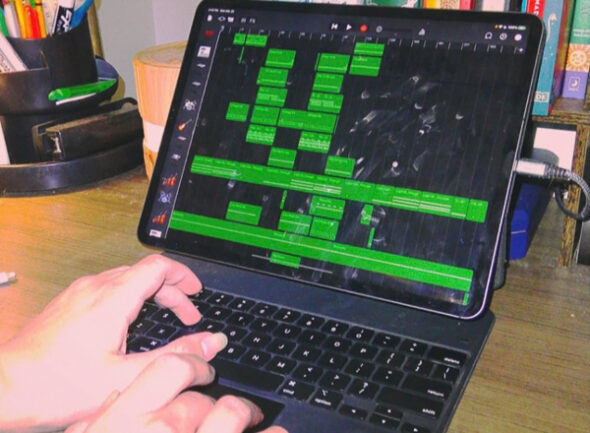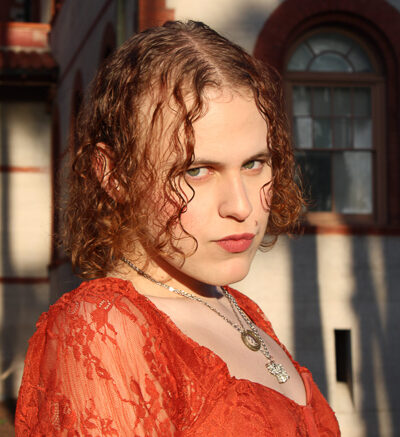Intended for audiences interested in learning more about accessible ways to create music.
By Josiah Friedman
Who is Emma Carr?
Emma Carr, a freshman student at Flagler College, has always been surrounded by music. Growing up, her father was the drummer in a Christian rock band. Today, she is a transgender woman taking the step into making her own music under the stage name “Salem Sylvan.”
For a good chunk of her childhood, Carr spent her time following her dad around on tour. He was the drummer for Third Day, a famous Christian rock band that sold over 7 million albums in the United States. His band toured worldwide, giving Carr the opportunity to follow him around and learn the ins and outs of the music industry.
Naturally, Carr learned a few instruments throughout her life because of her close connection to music. She played piano for four years and has played the violin on and off for eight.
However, she always wanted something more to come out of this.
“I had so many ideas of songs to write and sounds to create. I was bursting with ideas, so I took to Garage Band to execute it however I could,” Carr said.
The accessibility of Garage Band, a free software that allows users to create music, is what really prompted her to take that step into recording her own music.
“I wanted to do it for so long, but I didn’t think I could,” Carr said. “but now I’m just doing it.”
Garage Band offers Carr the opportunity to create music to accompany her lyrics without having to know how to play every instrument. She is able to include a variety of sounds and instruments in her production that she would normally have no idea how to produce.
“Being able to compose my own music without necessarily knowing how to play each instrument really helped me take that step into making music,” Carr said. “I know that artists can be ridiculed for not playing certain instruments or having other artists play the instruments for you.” But for her, this factor is less important than the accessible opportunities that Garage Band provided for her music career.
Inspirations and Aspirations
Aside from growing up around the music industry, Carr has always been interested in music. She claims her inspirations in songwriting to be artists like Lana Del Rey, Taylor Swift, and Ethel Cain (another transgender woman who produces her own music.) When I asked Carr what artists she would compare her own music to, she said, “I would say it’s like the female version of Hozier, and also Florence + The Machine.”
Carr is very interested in creating music that tells a story, and she plans to write more concept albums in the future. “I want to explore different themes and blend worlds of fiction and music more,” Carr said. “I want my music to be enjoyed the way a book is enjoyed. I can add to the story with sound as well as just the writing.”
Carr already has four songs published on SoundCloud and YouTube, which she plans to be the singles for her first album. These songs explore a variety of topics such as her experiences as a transgender woman in a Christian household, love, and even how Taylor Swift has inspired her. She plans to release her debut album by the end of the summer, and she is looking to find a reputable music distributor in order to release her music on major music platforms like Spotify and Apple Music.
“I already have five albums that I want to make[in the future],” Carr said. “The first two have the most thought poured into them.”
Carr explained that while being an independent artist can be hard in a multitude of ways, it’s one of the things that inspired her to begin making music. The lack of a time crunch, deadlines, and pressure were all things that offered her more freedom to create what she wanted.

The Rewards of Songwriting
Creating music has provided Carr with the ability to understand her own creativity in an even deeper way.
“I can explore why I add certain things to my songs. It helps me learn how to convey messages in more abstract ways,” Carr said.
Carr explained that a lot of the elements she adds into her music are very unique to her, which helps her express herself and learn more about her creativity. She hopes that, in the future, making music can teach her an even deeper form of self expression.
“It’s [Carr’s songwriting process] like therapy to me, it’s very cathartic,” Carr said.
Naturally, one could assume that releasing music for the public to listen to could be daunting, especially for a first-year college student who is newer to the process and is also juggling other responsibilities. However, Carr isn’t too worried about it.
“I make the music just for me,” she said. “If other people like them and relate to them, it’s just a plus, but the music is for me.”
Carr writes songs about topics personal to her, and this has helped her express herself and deal with internal issues. Opinions from other people just don’t matter to her, and she’s making this music for herself.
Carr has a strong sense of courage that continues to allow her to make music. She doesn’t let anyone get in the way of what she loves to do.
“I know it’s a possibility to be judged or made fun of,” Carr said. “But at the end of the day, I write these songs for me, and if someone judges that, they’re not worth entertaining.”



Be the first to comment on "A new take on music making: aspiring singer/songwriter, explains her passion for music and what made her leap into pursuing her dreams"